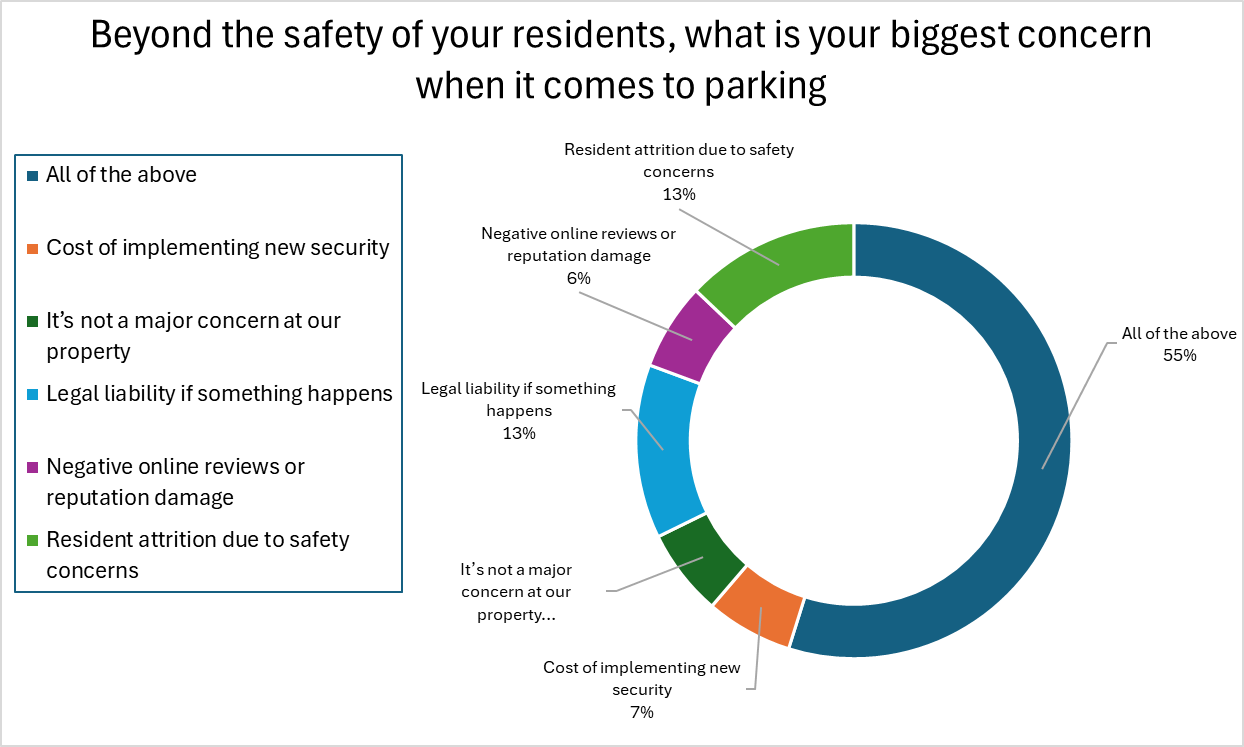How Trespassing Impacts Multifamily Property Security
CSAI Blog
READ NOW
Blog
-min.png)
Car break-ins are no longer isolated incidents—they’re a persistent threat to multifamily communities across the country. A car is broken into every 26 seconds in the U.S. More than 3 million car break-ins occur annually—over 1 million of which involve vehicle theft. Alarmingly, approximately 40% of these incidents happen on multifamily properties.
In a recent Multifamily Crime Poll, 62 property management professionals participated in a live poll that shed light on the frequency of car break-ins, their biggest concerns around parking security, and the current tools they’re using to protect their properties.
Here’s what we learned—and why your video management system may be the most critical upgrade you can make in 2025
68% of respondents reported experiencing car break-ins multiple times a year, with 18% saying it happens multiple times a month.The takeaway: Car break-ins are the norm, not the exception. Over half of properties are impacted yearly or more—almost 20% of property managers said they’re experiencing this problem multiple times a month.

This isn't just a nuisance—it's a growing crisis. For property managers, the implications extend beyond damage to vehicles. Repeated break-ins can lead to:
On a primary level, car break-ins and auto theft from the garage generates angry residents, leading to resident attrition, poor reviews, insurance hikes, and leery prospective residents. Property professionals listed their top concerns regarding parking lot and garage safety:

The results are clear: when a resident's car is broken into, it’s not just a property crime—it’s a potential legal, financial, and reputational headache for management. Several participants noted that the inability to respond with evidence damages trust and leads to higher turnover.
The legal answer is: “It depends.” Generally, landlords are not automatically liable for the criminal actions of third parties. However, legal exposure increases significantly if:
“You might not be liable for the first break-in. But the tenth? That’s where foreseeability comes in.” Melinda McBeth, Counsel at Offit Kurman
Your exposure depends in no small part on your state’s negligence standard:
These laws shape your risk exposure if you're sued for property damage or personal injury resulting from a car break-in. Check the negligence standard in your state here.
When break-ins go unchecked, property managers face mounting costs:
Consequence -> Impact
Resident attrition -> Vacancy costs, lost rent
Insurance hikes -> Higher premiums across properties
Lawsuits -> Claims for car value, damages, trauma, missed work
Staff diversion -> Pulling employees to monitor garages
Security fixes -> Emergency guard hiring, camera repairs
Plaintiffs can claim they want compensation in the form of full vehicle replacement, emotional distress, lost wages, and insurance rate increases. Even if the lawsuit fails, the legal fees and time drain are real.
Given the severity of the issue, participants were asked what kind of security coverage currently exists in their parking areas. The responses revealed a major gap: 33% of respondents reported having only one measure of defense – guards or cameras. Almost a quarter of respondents cited having no security measures at all.

Interestingly, the 13% of properties with cameras and remote monitoring in their garage echoes a tenant safety article, The State of Tenant Safety & Satisfaction in 2024, published by the National Apartment Association. That survey said while only 13% of renters reported living in properties with monitored video surveillance, but those residents:
This is a major competitive advantage—especially when resident retention and online reviews directly affect Net Operating Income.
Traditional security cameras are no longer enough. Given the scope of the problem, multi-family properties need a proactive, real-time video management system that is:
Watch this video of real time footage to see thieves run when they hear a Voice Down in a parking garage.
When used proactively, this kind of smart surveillance can dramatically reduce incidents and provide the documented evidence needed for police, insurance claims, or legal protection. At Cloudastructure, customers in 2024 experienced a 98% deterrence rate on threatening activity in their garages, mail & package rooms, and more.
Cloudastructure’s AI Surveillance and Remote Guarding platform is designed for multifamily properties that need a smarter, faster response to security threats. With cloud video management and proactive deterrence, you can stop car break-ins before they start.
Visit us today or Book a Call with me to schedule a free compliance assessment!
Ernest Mendoza Jr.
Business Development Representative
650-204-1202
ernest@cloudastructure.com
Disclaimer: The Multifamily Crime Poll data referenced in this article was collected by Cloudastructure and is proprietary. Reproduction or distribution of this data in any form requires prior written permission from Cloudastructure.






